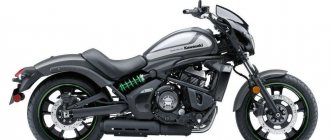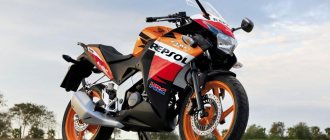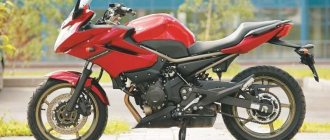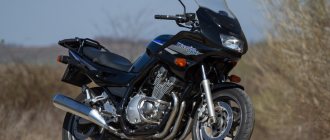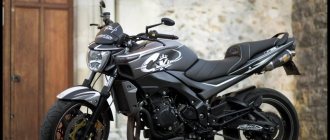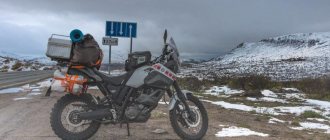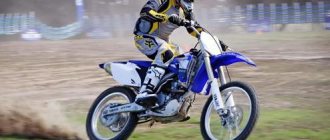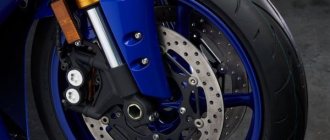- motorcycle model, Yamaha brand,
The Yamaha BT 1100 Bulldog naked model was first presented as a concept in the late 90s, and official mass production began in late 2001. The model was developed by the Italian division of Yamaha Belgarda and was intended for sale in the European market, although in some years the Yamaha BT1100 Bulldog was also officially sold in South Africa.
The algorithm for creating new motorcycle models by the Italian division of Belgarda was as follows: the concept and frame of the motorcycle were developed, after which the model was assembled from many standardized components, including those made in Europe. For example, the Yamaha BT1100 Bulldog received an engine from the Yamaha XV1100 Virago cruiser (also installed on the old Yamaha TR1 model and the newer Yamaha XVS1100 Drag Star cruiser), front brakes from the Yamaha YZF-R1, rear brakes from the Yamaha XJ900 Diversion, and a fork from the older versions Yamaha XJR and swingarm from the XJ model series.
The Yamaha BT1100 Bulldog engine is a 2-cylinder V-shaped 4-valve air-cooled unit with a capacity of 1063 cc. see, producing 65 hp. power and 88 Nm of torque. The motor is low-speed, with powerful thrust throughout the entire operating range, maximum performance is at 4500-5500 rpm.
The chassis is presented in the form of a steel tubular frame, suspension in the form of a conventional telescopic fork and monoshock absorber, disc brakes at the front (2 discs, 298 mm, 4-piston calipers) and rear (1 disc, 267 mm, 2-piston calipers), cast wheels 17′ and cardan drive.
The Yamaha BT1100 Bulldog model existed in the Yamaha line until 2007, after which it was discontinued. Currently, the motorcycle is quite rare on the Russian market and is practically not in demand. This is mainly due to high cost and modest dynamic characteristics. In addition, the concept of a motorcycle, based on a combination of two classes that directly contradict each other - naked and cruiser, will be understandable only to a limited number of users.
Bike features
The main features of the Yamaha BT 1100 Bulldog include:
- noisy but highly reliable gearbox;
- excellent brakes;
- sharp, impetuous disposition.
If you want to buy a stylish motorcycle for city riding, this model is exactly what you need. In principle, high speed in urban areas is not needed, so the cruiser properties only benefit this motorcycle, allowing you to enjoy those driving features that are not available to a typical naked bike.
A post about buying and rebuilding a Yamaha BT1100 Bulldog received positive feedback and generated interest in this rare model. So I got ready, rolled it out of the parking lot, washed off the winter dirt with a rag and took a few photos. Who is interested in a classic with an engine from the Drag Star cruiser, YZF-R1 sports brakes, a cardan drive and Italian roots - please, under cat. It will be especially interesting for those who are considering buying it. You can watch, read, listen, touch with your hands.
You can read a couple of reviews of the bulldog here and here.
Main technical characteristics:
- Engine: 4 valves, V-Twin, 1063 cm3.
- Torque: 81 Nm
- Power: 64 hp
- Dry weight: 230 kg
- Fuel tank: 20 liters
- Consumption: ~5l./100km.
- Drive: cardan.
- Maximum speed: 175km/h.
Appearance: This is a classic, with all that it implies: there is no plastic, the windshield is decorative, the driver’s seat is straight. The designers, in my opinion, did a good job on its appearance. Who's to say it's not stylish? A simple round headlight with a darkened visor, a humpbacked tank, a low driver's seat, a high second seat. The rear is shortened, which gives it a sporty flavor. You can put a wider wheel, but I like the original size.
Landing:
The driver's seat is quite low. With a height of 180 cm, I can easily reach the ground with my full feet. The seat is soft, the butt doesn’t get tired of sitting. The width of the seat is just right: the legs don’t get loose when trying to reach the ground, and there’s no pain on long rides, there’s enough space. I didn’t sit in the second number’s place, but I think I’ll take the girl for a ride in the summer and find out her opinion.
In the photo: both feet are on the ground, I can still raise my butt a couple of centimeters from the seat.
Dashboard:
The tidy consists of 3 blocks.
Speedometer + tachometer . The speedometer is large and the speed is easy to read. The tachometer is smaller, but it is needed less, the bulldog almost always pulls. The odometer is digital, it can show: the total distance traveled, track the distance traveled since the moment of zeroing, and there is also a clock! When the reserve is turned on in the tank, the odometer begins to count the distance traveled on reserve. Taking into account the 5L reserve, you can count on about 100 km, but I wouldn’t risk it... Light bulbs : standard set - neutral, high beam, turn signal, oil, reserve. There is no leg sensor light, but the sensor itself is there. So if you try to drive without raising your foot, the engine will stall. In the sun the light bulbs are difficult to read, but in the shade and at night they are excellent. They don’t blind, they don’t catch the eye. The odometer, speedometer and tachometer are always easy to read. At night, the backlight is also not striking, but everything is visible perfectly. After turning on the power, before starting, the computer will rotate the speedometer/tachometer arrows, conducting self-diagnosis; at this time the engine cannot be started. The ignition key, in addition to the standard ON, OFF and Steering lock modes, has a Parking , in which the steering wheel is locked, the ignition is turned off, but the side lights are on so that the motorcycle can be seen at night.
rice. Dimensions in parking mode.
Control levers: Gas, brake, brake, clutch - everything is in place. The front brake is hydraulic, the rear brake and clutch are cable. Turn signals, lights, ignition, horn - everything is at hand. There is a high beam blinker (works even when the low beam is off). There are no emergency lights, I'll try to install them myself. Maybe this is a plus? You need to invest not only money, but also time, effort, and soul into your bike. Hazard light, cigarette lighter, alarm, GPS tracker, saddlebags, sliders, roll bars, wind deflector, airbrushing, LED turn signals... Sorry, skidded xD
Driving... around town: Handling is excellent. The motorcycle is not big, it fits between the rows easily. The center of gravity is low, and I haven’t gotten tired of maneuvering in traffic jams yet. The brakes are good, it accelerates quickly, there are no problems in city driving. I fit into the same place where I fit on the Sibikha, the dimensions allow it. Engine cooling is air. In our region, temperatures in the shade often reach 38 in the summer. I will evaluate its resistance to overheating in city traffic jams - I will answer the myth of whether it gets hot or not.
outside the city: after a whole day in the saddle, your butt doesn’t start to hurt, the saddle is comfortable. He eats little, half a grain a day, 5 liters per 100 km. In practice, a tank of 20 liters is enough for me to travel from Temryuk to Krasnodar (140 km), go about my business there and return back. The reserve turns on 20 kilometers before Temryuk, total 15l = 270/300km. There is no windshield, and it is not needed; the cruising speed of the motorcycle is 120-150 km/h. On a flat road the bike feels great, on a wet road - no problem. On cold roads the grip is weak, so be extremely careful when cornering. The liter engine, despite the low speeds, makes itself felt. And the motorcycle accelerates easily and naturally, even at a speed of 120 km/h, which is very convenient when overtaking trucks and other traffic, without downshifting. The maximum speed was 150 km/h. More is possible, but I try not to keep the revs above 5 thousand. The Bulldog is not a sport, despite its aggressive appearance, and is not designed for high speeds.
Final comparison of speed with a sea bream: the maximum speed is approximately the same, but the acceleration dynamics of a bulldog are incomparably better. And as a bonus, I pull the gears much less often.
Sound: The V-twin has a different sound from the inline four: it is lower, rumbling, bassy. Gives the impression of a powerful motor. Within the city limits it is clearly audible; drivers and pedestrians easily notice it if they accelerate with the clutch depressed. If you need to drive quietly and not wake up the neighbors’ grandmothers, just don’t raise the speed above 3000, the mufflers do an excellent job.
Light:
Rice. Low beam and brake light.
The bulb is an ordinary galgenka, not xenon. The diffuser is good and distributes the light evenly. There are no complaints about the high beam either. There is also a separate side light bulb, it is located above the general light. A useful bonus to the main lighting if you need to stand in the dark and not waste energy on a powerful low beam. I couldn’t find the headlight adjustment, apparently there is no such option. By the way, to change the light bulb in the headlight, you just need to unscrew two bolts, and the headlight with windshield tilts down, like the cab of a Kamaz truck! Very comfortably!
Trunk:
There are two glove compartments in the motorcycle, and both are very small. One is located directly under the driver’s butt, the second is in the tail. The original set of tools fits into the tail compartment.
Finally, a few more photos and one video:
Removed saddle.
The oil level can be seen through the window.
And a photo with the owner, whose level of satisfaction reaches the level of “a cat during Maslenitsa”:
Promised video with sound:
At 13 seconds the red brake light cover fell out, everything is ok - it’s just not screwed on.
Dimensions and weight
The BT 1100 Bulldog cannot be called a light motorcycle, because even without fuel its weight is 229.5 kg. However, compared to many cruisers, the model is quite light. The volume of the fuel tank is atypical for the average naked bike and is more like a cruiser, amounting to 20 liters. At the same time, gasoline consumption is low and reaches only about 6 liters per hundred kilometers. The seat height is 812 mm, which makes the model unsuitable for short people.
Brief history of the model
2001-2002 — the Yamaha BT 1100 Bulldog model was presented for the first time at the Intermot motorcycle exhibition in the German city of Munich. Official start of production. This year's models are officially sold in Europe and South Africa. Colours: black, white metallic, blue metallic. Model: Yamaha BT1100 Bulldog (Europe, South Africa). Factory designation: 5JN1.
2003 - no significant changes. Colors: black, white metallic, white-orange. Model: Yamaha BT1100 Bulldog (Europe, South Africa). Factory designation: 5JN2.
2004 - no significant changes. This year's models are not sold in South Africa. Colors: black, white metallic, orange. Model: Yamaha BT1100 Bulldog (Europe). Factory designation: 5JN3.
2005 - The bike receives minor updates to the ignition system, instrument panel and seat shape. Colors: black and white, black and cherry, black and blue. Model: Yamaha BT1100 Bulldog (Europe). Factory designation: 5JN4.
2006 is the last year of production of the model. The Yamaha BT1100 Bulldog is also sold in South Africa. Colors: same as previous year. Model: Yamaha BT1100 Bulldog (Europe, South Africa). Factory designation: 5JN5.
Chassis and brakes
The rear suspension is Sachs, and its type is a pendulum version with a monoshock absorber. The travel of the front telescopic fork is not very large and amounts to 130 mm. The brakes are disc, with a pair of discs at the front, which makes the BT 1100 Bulldog quite safe.
The bike's rims are alloy, but they look quite strict and classic. The massive chrome exhaust pipe is very characteristic. The swingarm is made of aluminum, and the tubular frame is made of steel.
Yamaha Bulldog. Strange dog
Many people reasonably stay away from the bulldog, since this dog’s caricatured appearance hides a ferocious temperament. With the Yamaha Bulldog it’s the other way around: they shun him because behind his warlike appearance lies a soft heart.
Igor Vladimirov
Many people reasonably stay away from the bulldog, since this dog’s caricatured appearance hides a ferocious temperament. With the Yamaha Bulldog it’s the other way around: they shun him because behind his warlike appearance lies a soft heart.
Yamaha Bulldog © Photo: Yamaha
The presentation of this largely strange motorcycle took place last summer. The model is produced by the Italian branch of Yamaha and is intended primarily for the European market.
Starting from the first day of its existence, the “dog” is subjected to powerful ostracism from many lovers of two-wheeled vehicles. The main complaints relate to the obvious inconsistency of the catchy appearance and insufficient engine power. In appearance it looks like a street fighter, in terms of the engine it looks like a road bike, albeit with excellent traction. In principle, no one claims that a motorcycle is bad, it’s just that, according to the stereotype of perception, such a symbiosis is unusual.
The Bulldog's design is truly original. Along with aggressiveness, there is something soft and attractive about him. Even the “humpbacked” fuel tank, reminiscent of the tanks of Yamaha sports touring models, in the guise of a “street hooligan”, oddly enough, acquires a certain charm.
Yamaha Bulldog © Photo: Yamaha
The engine, borrowed from the 1999 XVS1100 Drag Star cruiser, is shaped and painted reminiscent of the company's long-running hit, the V-Max. Those who have ridden Yamaha cruisers are familiar with the advantages of the V-shaped 1100 cc air-cooled “twin”: smooth operation in a wide speed range, excellent traction and sound with a specific cut-off, which, however, on modern models is quite muffled by the exhaust system ( It should be noted that it is adjusted by the manufacturer to the most modern environmental standards). In Bulldog, the sound problem is complicated by two more specific “whistles” and increased engine speed. So, in terms of acoustics, this motorcycle is more of a “road whistling athlete” than a classic cruiser.
The Bulldog engine has slightly different characteristics than the Drag Star engine. The maximum power here is produced at 6500 min-1 instead of 5750, moreover, its value is three “horses” more. The gearbox is very similar to a “braked star” transmission. Obviously, the cardan shaft that drives the rear wheel of the motorcycle was borrowed from there.
Yamaha Bulldog © Photo: Yamaha
The frame is open, made of special section pipes. The engine integrated into it plays the role of a power element. The torsional rigidity of the structure has increased, which, as is known, significantly affects the behavior of the motorcycle both in quiet driving conditions and in emergency situations. Thanks to this, it was possible to reduce the overall weight of the machine.
The rear suspension is based on an aluminum alloy swingarm with a progressive characteristic, which, in theory, indicates the sporting ability of the “bull dog”. Now, if it weren’t for 65 horsepower... With such a design of the frame and rear suspension, you need an engine with a power of at least 90 hp, but, as they say, what goes up comes up.
Many opponents are especially surprised by the presence of a motorcycle with such a modest power of a braking system, almost completely “adopted” from the famous 152-horsepower “athlete” YZF-R1, better known as simply R1. Like, why does a slow-moving vehicle, accelerating at best up to 180 km/h, need brakes that cope well with speeds over 250 km/h? Reinsurance? No. Most likely, the fact is that the well-tested and reliable brake system provides good deceleration of the Bulldog in almost any speed mode, and for a relatively heavy (229.5 kg) motorcycle this is important.
In a word, you won’t immediately understand what kind of animal this is, for what purposes it should be used and how best to treat it. But, having ridden it, you can understand the following. Firstly, Bulldog is predictable and safe, forgiving of many mistakes. Secondly, it is very easy to use. Thirdly, it is simply attractive - both from the outside and from the driver’s seat.
The status of the model can be determined as follows: a motorcycle for the city and for the highway, with leisurely acceleration and a low maximum speed. If you are not guided by the statements of hardened bikers, muttering boring things through their lips about what a “correct” motorcycle should be, then communicating with this “dog” will leave a pleasant impression. True, riding together, especially on long stretches, will not bring the driver and passenger the joy that you expect from a classic road motorcycle.
The editors recommend:
KAMA PRO - extended-life tires
The Russian car market has collapsed by 20%
Service station workers face prison for driving a client's car
Russian car dealers have surpassed Italian ones
News Media2
